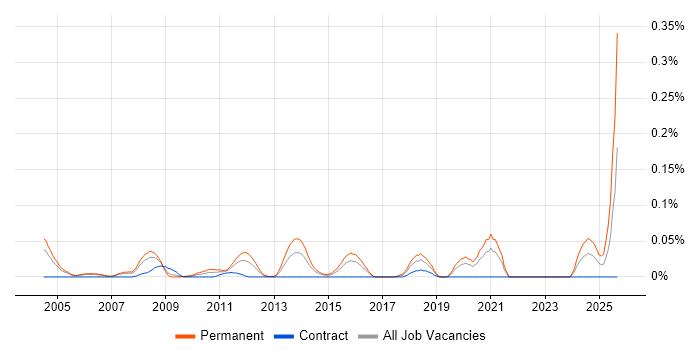Quantitative Investment
Central London > City of London
The table below provides summary statistics and salary benchmarking for jobs advertised in the City of London requiring Quantitative Investing skills. It covers permanent job vacancies from the 6 months leading up to 26 October 2025, with comparisons to the same periods in the previous two years.
| 6 months to 26 Oct 2025 |
Same period 2024 | Same period 2023 | |
|---|---|---|---|
| Rank | 127 | 169 | - |
| Rank change year-on-year | +42 | - | - |
| Permanent jobs citing Quantitative Investing | 2 | 3 | 0 |
| As % of all permanent jobs in the City of London | 0.13% | 0.11% | - |
| As % of the Processes & Methodologies category | 0.13% | 0.12% | - |
| Number of salaries quoted | 1 | 0 | 0 |
| 10th Percentile | - | - | - |
| 25th Percentile | £150,000 | - | - |
| Median annual salary (50th Percentile) | £160,000 | - | - |
| 75th Percentile | £170,000 | - | - |
| 90th Percentile | - | - | - |
| Central London median annual salary | £160,000 | - | - |
All Process and Methodology Skills
City of London
Quantitative Investing falls under the Processes and Methodologies category. For comparison with the information above, the following table provides summary statistics for all permanent job vacancies requiring process or methodology skills in the City of London.
| Permanent vacancies with a requirement for process or methodology skills | 1,501 | 2,594 | 2,976 |
| As % of all permanent jobs advertised in the City of London | 95.97% | 93.88% | 95.14% |
| Number of salaries quoted | 1,211 | 1,696 | 2,677 |
| 10th Percentile | £40,000 | £46,250 | £41,250 |
| 25th Percentile | £55,000 | £55,000 | £55,000 |
| Median annual salary (50th Percentile) | £75,000 | £75,000 | £74,000 |
| Median % change year-on-year | - | +1.35% | -1.33% |
| 75th Percentile | £96,875 | £95,000 | £96,250 |
| 90th Percentile | £122,500 | £115,000 | £117,500 |
| Central London median annual salary | £75,000 | £75,000 | £72,500 |
| % change year-on-year | - | +3.45% | - |
Quantitative Investing
Job Vacancy Trend in the City of London
Historical trend showing the proportion of permanent IT job postings citing Quantitative Investing relative to all permanent IT jobs advertised in the City of London.

Quantitative Investing
Salary Trend in the City of London
Salary distribution trend for jobs in the City of London citing Quantitative Investing.

Quantitative Investing
Co-Occurring Skills & Capabilities in the City of London by Category
The following tables expand on the one above by listing co-occurrences grouped by category. They cover the same employment type, locality and period, with up to 20 co-occurrences shown in each category:
